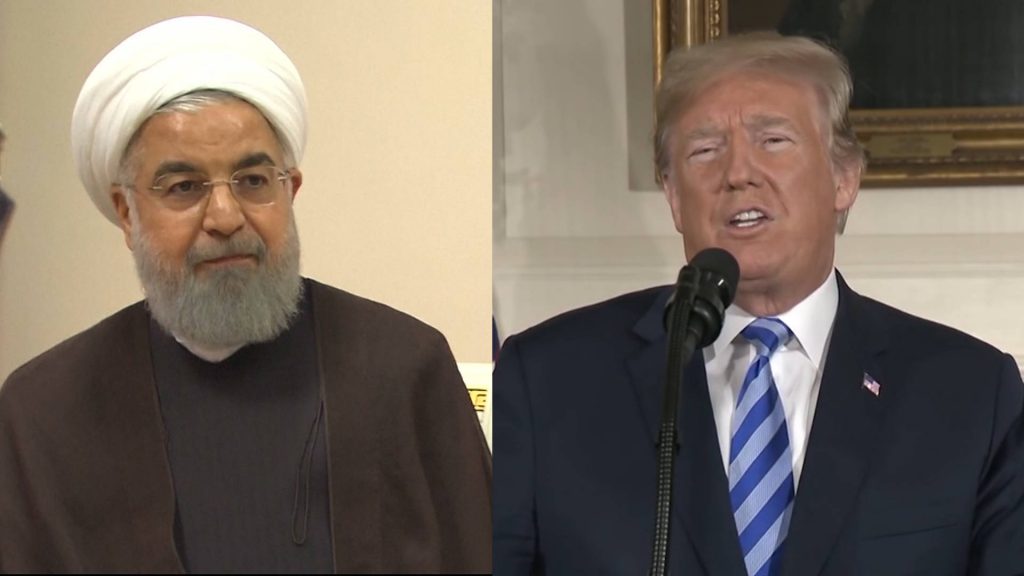Iran has taken the United States to the International Court of Justice (ICJ) at The Hague, over validity of unilateral sanction imposed over it. Iran has sighted the 1955 U.S.-Iranian Treaty of Amity to invoke the jurisdiction of International Court of Justice (ICJ). Under Clause 2 of Article XXI of the treaty if dispute between the parties if not resolved by diplomacy, then either party can approach ICJ. The treaty was signed by the two countries in 1955, during the terms of U.S. president Eisenhower and Iranian prime minister Hossein Ala. The treaty emphasizes friendly relations while encouraging mutual trade and investments and regulating consular relations
The Treaty was signed at Tehran on August 15, 1955; ratified by the United States of America on September 14, 1956; ratified by Iran on April 30, 1957 and subsequently entered into force June 16, 1957. The treaty was signed in the aftermath of the democratically elected Iranian government of Prime Minister Mohammed Mossadeq was overthrown in a coup orchestrated by the governments of t U.S.A and UK under name Operation Ajax in 1953.
The objective of the coup was to oust the government of Prime Minister Mohammed Mossadeq, and reinstall Shah of Iran Mohammad Reza Pahlavi with almost dictatorial powers and policies favouring the Americans and the west. In March 1951, Mosaddeq submitted a bill calling for nationalization of the oil industry to the Iranian parliament. On May 1, immediately after taking office of Prime Minister, Mosaddeq signed the nationalization bill into law. This move greatly popular with Iranians, threatened both British and American interests- fear of communist takeover of Iran and loss of control over Iranian Oil sector.
Against this backdrop the USA and UK colluded to overthrow Prime Minister Mohammed Mossadeq and reinstalled Shah of Iran with greater powers. The Shah ruled over Iran who ruled the country with an iron fist for 26 years until he was overthrown in the Iranian Revolution of 1979. Shah’s regime was marked with pro-American anti-Soviet policies. Operation Ajax was the first United States covert action to overthrow a foreign government during peacetime.
Shah regime saw Iran emerge one of closest US allies. The treaty is a product of that era. Despite Iran after the Islamic Revolution of 1979 withdrawing from the Bagdad Pact in February, 1979 and US severing diplomatic ties and imposing sanctions on Iran in April, 1980, the 1955 U.S.-Iranian Treaty of Amity has continued to operate with neither Iran nor USA withdrawing from it formally.
Both the counties have used the treaty to invoke the jurisdiction of ICJ. In the past, ICJ has assumed jurisdiction on the basis of this treaty. Once during Diplomatic and Consular Staff crisis in Tehran in 1979-80 where Court held that Iran had violated and was still violating obligations owed by it to the United States under conventions in force between the two countries and rules of general international law, that the violation of these obligations engaged its responsibility, and that the Iranian Government was bound to secure the immediate release of the hostages, to restore the Embassy premises, and to make reparation for the injury caused to the United States Government.
In May 1989, Iran sued United States of America in the ICJ over the shooting down of Iran Air Flight 655 by US Naval Ship. USA raised preliminary objections to the jurisdiction of the Court, however as both the parties arrived at out of court settlement proceedings in ICJ were discontinued.
Iran in 1992 again approached the ICJ in the Oil Platforms case against the destruction of Iranian oil platforms wherein USA filed a preliminary objection to the Court’s jurisdiction same was rejected by the court. The court in case held attacking on two occasions and destroying three offshore oil production complexes, owned and operated for commercial purposes by the National Iranian Oil Company, the United States had violated freedom of commerce between the territories of the Parties as guaranteed by the 1955 Treaty.
ICJ on August 30th concluded hearings on indication of provisional measures. During the proceedings Iranian side argued that the sanctions violated the 1955 Treaty between Iran and the US, which grants the ICJ jurisdiction over disputes and prayed for suspending US sanctions as an interim measure. The Iranians further submitted that USA has no cogent reasons to re-impose sanctions, as IAEA has repeatedly confirmed that Iran has been complying with the terms of the nuclear deal. US sanctions are besieging Iran economically, with all the dramatic consequences that a siege implies for the besieged population. Americans submitted before the court that it lacks jurisdiction in the dispute, and that Iran’s assertions fall outside the bounds of the treaty.
The ICJ is the principal judicial organ of the United Nations; its judgements are binding, though it lacks power to enforce them. Article 94 of the UN Charter lays down that it shall be duty of all UN members to comply with decisions of the court involving them. If parties do not comply, the issue may be taken before the Security Council for enforcement action. However, this is a very weak mechanism and was proved ineffective after Nicaragua case, wherein Nicaragua brought the issue of the USA’s noncompliance with the court’s decision before the Security Council. USA blocked enforcement of the judgment using its Veto power.
If ICJ rules in favour of Iran and US declines compliance of the interim order, it would be interesting to see how the world community and other signatories to the Iran Deal react, the unilateral sanctions by US do not enjoy support from US allies and world community. Will it lead to setting up of alternative payment systems?
Disclaimer: The opinions expressed in this article are the personal opinions of the author.


















